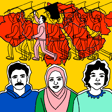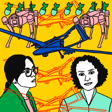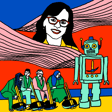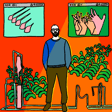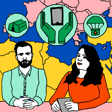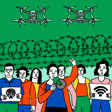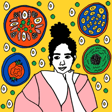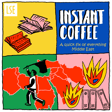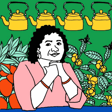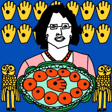Become a Creator today!Start creating today - Share your story with the world!
Start for free
00:00:00
00:00:01

1.7. Locating Afghanistan in the 'Middle East' with Moshtari Hilal
On this episode of Instant Coffee, Marral Shamshiri-Fard talks to Moshtari Hilal about locating Afghanistan in the 'Middle East', as well as her own artistic practice. Moshtari Hilal is a visual artist and researcher working from Hamburg and Berlin. Website: www.moshtari.de/ Instagram: @moshtarimoshtari
Transcript
Feminist Perspective on Beauty
00:00:00
Speaker
I think it's a feminist responsibility to talk about the surface, not only about beauty as surface, but also the biological surface, the everyday body that we carry with us. I think there is no separation between the intellectual and the superficial.
Podcast Introduction: 'Instant Coffee'
00:00:18
Speaker
This is Instant Coffee, a new podcast brought to you by the LSE Middle East Centre and produced by me, Nadine Almanasvi and me, Ribal Sleiman Haidar.
00:00:30
Speaker
On this episode, Maral Shanshili Farid talks to Mushtari Hilal about writing Afghanistan into the Middle East.
Afghanistan in Middle Eastern Studies
00:00:37
Speaker
Maral is a PhD candidate at LSE working on Middle Eastern history. Mushtari is a visual artist and researcher working from Hamburg and Berlin. She is also co-founder of the International Research Collective AVA, Afghan Visual Arts and History. Over to you, Maral.
00:00:56
Speaker
Hi Moshe, it's so exciting to be in conversation with you. Thanks for joining us. Thank you for inviting me. So I guess let's just get started then. Can you tell us a little bit about your work and specifically how Middle Eastern studies informs your art and your research?
00:01:15
Speaker
Yeah, so I'm a self-taught artist, so basically I started studying something completely different. It's similar to Middle Eastern studies, but in Germany it's called Islam Wissenschaften, which you could describe as Islamic science, but it's secular and I mean when you look at the
00:01:36
Speaker
readings and everything. It's basically Middle Eastern studies. And I studied that in my BA and now in my MA, but I never finished my MA because I got more involved in the arts later. And my first intention was to learn more about my background and my religion and everything. And I was born in Afghanistan, so
00:02:02
Speaker
I just assumed I was going to learn about that. But the more I got involved in Middle Eastern studies, the more I understood how complicated and constructed and fictional these categories are and how basically
00:02:24
Speaker
Basically I learned to question everything and I think this is the basic and most crucial influence of Middle Eastern studies on my intellectual process and then later my creative process.
Exclusion of Afghanistan from Regional Studies
00:02:39
Speaker
Yeah, that's really interesting to see how your individual path and your experience has brought you to where you are.
00:02:49
Speaker
I kind of want to push a bit on what you mean by this construct of the Middle East and you know from my perspective sometimes in Middle Eastern studies we focus more on the Arab world
00:03:04
Speaker
And it feels like some voices are more included while others are excluded. So I'm wondering how do you see Afghanistan fit into this construct of the Middle East? Was it and is it there for you? I felt that Afghanistan was not considered as an area of interest in either Middle Eastern studies.
00:03:26
Speaker
South Asian studies, Central Asian studies. I mean, there were like these area studies, but whenever it came to Afghanistan, it was not focused. And the only focus that Afghanistan was given is the security studies or the conflict studies.
00:03:47
Speaker
And I think, of course, that's connected to the fundings, where is funding coming from and why is academia or in general the international community more interested in this approach to studying Afghanistan. So when we look at Afghanistan from this security perspective, it's mostly post 9-11 or
00:04:15
Speaker
may be concerned about the Soviet Union, so there's always a bigger theme or a bigger framework when it comes to Afghanistan. And I personally thought that if I studied Middle Eastern Studies, and again in Germany it was not called Middle Eastern Studies, but Islam Wissenschaft,
00:04:36
Speaker
This field of studies would be concerned or interested in Islamic or Muslim intellectual history in general, society or political history, but it was mainly Egypt, to be honest, and if not Egypt, it was Iran.
00:04:55
Speaker
And that's because the most crucial or popular academic texts and research were based on working with case studies from these countries.
00:05:11
Speaker
So in the end I felt like it was pretending to be about Muslim societies but not really about all Muslims and all Islamic history. And then later I moved to Berlin where they tried to expand their focus
00:05:30
Speaker
And we did some things about Muslims in Indonesia and India, for example, and also one of my professors, Shirin Amir Moazamy, who's from the sociology. Originally, she opened up this focus on Muslims in Europe. So she tried to shift the focus to an area towards more transnational
00:06:00
Speaker
community or culture or topic. But again I never felt that Afghanistan was covered as I wished.
00:06:11
Speaker
Yeah, I mean, I guess it's interesting to see how those differences have emerged, I guess, in how the field has developed in Germany as opposed to here in the UK. I guess there is a particular legacy of German Orientalism there. We do have both Islamic studies and Middle East studies here in the UK, but I do really hear what you say on Afghanistan fitting a certain lens of study
Personal Archives vs. Mainstream Narratives
00:06:41
Speaker
why security or conflict and not culture and history, for example. On this question, then, I guess, you know, on the presence of Afghanistan, I feel like it's something we really see in your work. I find that one of the really beautiful and really tender aspects of your portraits is this recurring image of the family.
00:07:03
Speaker
the mother, the grandmother, specifically I'm thinking about the portrait of the mother sitting on a rug with a sewing machine in front of her working away. I wonder then to what extent are you creating an archive of Afghanistan? What does your visualization of this family archive mean? And I guess what story are you trying to tell through it?
00:07:29
Speaker
I think for me personally it was really important to realize that my family or my experience was not representing anything but my family and my experience because when I grew up I often was confronted with this one sentence like
00:07:46
Speaker
You can't do this because we're Avons, or this is our culture, this is Avron culture, or this is a Muslim culture. So I grew up not only with a generalization of a specific Avron Muslim experience,
00:08:02
Speaker
from an outside, like from the news or the mainstream majority culture, but also from moving my household, like my own family, my parents were instrumentalizing these terms to kind of censor our possibilities, our character, whatever.
00:08:24
Speaker
And I always thought that that was actually something very Avron, right? When I went back to Avronistan, because I have a lot of family there, still, my first experience was much earlier, but the first adult experience
00:08:43
Speaker
was when I graduated from school and I was interested in doing some research in Afghanistan or meet artists and at that time I wanted to become a journalist so I wanted to write a piece about the Afghan art scene and that was 2012
00:09:01
Speaker
And I went to Kabul and I met so many different people with different opinions, with different ideas of themselves, of the country. And I learned that my experience was not at all representative of this whole culture, country or its people.
00:09:24
Speaker
And so my family archive, but also the general approach in my work, the radical subjective approach is inspired by that, inspired by that feeling that in the end, I as an artist, but also as an intellectual or a person speaking in the public,
00:09:46
Speaker
cannot speak from any other position than from my own position and seeing that not as something like I don't think that's a failure I don't think that I'm biased by that but actually I think it's a really interesting position to speak from because whenever I speak from my position I do challenge the general or the objective
00:10:12
Speaker
idea of something so I think the family archive but also the personal archive the subjective can be a really interesting resource to critically review and contrast reality to your experience and whenever you say something that has not been said or in my case visualize something that has not been visualized you can
00:10:41
Speaker
you can show the blind spots of society or of national narratives or of mainstream ideas.
Art, Beauty, and Body Image
00:10:50
Speaker
You can also critically show where maybe society was interested in making you invisible or was not interested in writing down or
00:11:04
Speaker
displaying your reality and of course when it comes to Afghanistan my family was not part of the minorities but in Germany as a refugee kid and also as a non-white person I did
00:11:25
Speaker
experience how it is to be a marginalized and discriminated person and biography. So this is the whole context, I guess.
00:11:37
Speaker
Yeah, I really love this subjective position that you talk about. It's really powerful. And especially this aspect of visibility, you situated in Europe and visualising what you see when you're in Afghanistan. I find in your work, some things really stand out and you are challenging things on various levels.
00:12:02
Speaker
Two of the key motifs that I really like in your work are the big or prominent nose, very middle eastern, and the dark black hair on the body.
00:12:16
Speaker
especially on the bodies of women and girls. I remember the first time I came across your work a few years ago, I was just so struck by how political that statement was. So to what extent do you see your work as challenging existing norms, but also imagining new futures?
00:12:37
Speaker
I think the theme of the hair or body hair, facial hair in general, is something that has been discussed in European or Western culture as well. But what I didn't like about it was it was always a feminist issue or a feminist statement. For example, having armpit hair was a feminist statement and
00:12:59
Speaker
I personally realized that I didn't want to say anything with my body. It was a natural state. It was just not caring about shaving my arms or my belly or my mustache.
00:13:19
Speaker
I'm not making it into a statement but talking about how the everyday surface of our bodies is being not only politicized but constantly censored and
00:13:35
Speaker
made into a topic. This element was interesting to me, but also the element of black body hair. I think there is a difference between dark body hair and blonde body hair. It is not just about hair, but it's about hair being visible, right?
00:13:53
Speaker
And I did some research. I came across some articles discussing how body hair, and female body hair especially, is somehow connected to the grade of the human evolution. Like they would discuss whether women are more crazy, insane, or close to a primitive state of humankind, or even to an animal.
00:14:22
Speaker
when they are more hairy. This is basically a colonial state of research and it's somehow made into something that we just feel. Like when we see body hair we immediately have specific feelings and we just think it's a natural feeling but in the end it's deeply connected to studies made and knowledge produced about the ways bodies look and how they are
00:14:51
Speaker
Yeah, it's interesting that you saw the conversation that was happening about body hair but brought your own experience to that conversation. I wonder then, was there a similar thing that you saw with appearance and body image around the nose?
00:15:07
Speaker
As I live in Germany and I also grew up with German imagery and also historical imagery, there is a history of anti-Semitism rights in Europe and Germany especially.
00:15:23
Speaker
And if you look at the whole style or depiction of people with big noses, I see a direct link to this specific European history where people with strong features, a big nose, a long face, are portrayed as corrupt, greedy,
00:15:45
Speaker
an evil in general, criminal sometimes. And this is a racist stereotype that we inherit from this time, a European heritage, I think, that influenced
00:16:01
Speaker
global imagery. I like to give Disney, for example, as a source to study when we talk about this connection of featurism, especially featurism concerned with big noses, long noses, and these racist stereotypes. All evil characters in Disney have either dark hair or they have long faces and long nose, and I think there is no coincidence in that.
00:16:31
Speaker
And in the end, we also assume that faces that are more round or have bigger eyes, smaller noses, are brighter in general, are more reliable, trustworthy, lovable. And I personally experience that people, if they don't know me and they just look at my face, they think I'm not approachable or arrogant.
00:16:58
Speaker
And I think all these things they have an historical dimension, but they also have every day, day-to-day dimension that we sometimes don't talk enough about. And I think it's also a feminist responsibility to talk about the surface, not only about beauty as surface, but also the biological surface, the everyday body that we carry with us and how
00:17:25
Speaker
our surface in the end is responsible how we are, if we are judged, or how people respond to us. I think there is no separation between the intellectual and the superficial. I think in the end, the superficial is so much intellectualized that we have to study and discuss that definitely.
Exhibiting Art Across Cultures
00:17:46
Speaker
I mean, I'm interested to know, was there a different reaction to your work when you were in different places?
00:17:53
Speaker
I know you've exhibited your work in Europe and the US and also in Kabul, Tehran, Beirut. So, you know, was there a different response in how the audience in the Middle East perceived your work?
00:18:07
Speaker
I actually have a very vivid memory about my exhibition in Iran and Tehran. I was part of a group exhibition curated by Iranian artist, and she did this show about Afghan contemporary art from around the world. So there were artists from the US, like Afghan-American artists. There were many
00:18:33
Speaker
avant-artists from Afghanistan actually and then including myself, I'm an avant-german, I was the only female avant-artist that traveled to the exhibition and I was listening to some of the audience speaking about the work they were seeing and I was actually surprised and disappointed how there was even in Iran
00:19:03
Speaker
orientalizing or they had these assumptions and expectations when they came to the exhibition. For example, I heard one woman saying, oh how sad that they just came with their normal clothes and didn't wear their traditional avant dresses or outfits. There was an exoticizing view or gaze and
00:19:31
Speaker
sometimes they would say things like, wow, I can identify myself with your work or I can see myself in your work, but be like a little bit surprised about it. And for me, that was a really interesting experience because when I went to Iran and I traveled there, I felt that was somehow like traveling through Afghanistan because
00:19:57
Speaker
and Afghanistan I can't go everywhere so I couldn't visit villages with like a lot of mountains and nature and I was in Apioni in Iran and I thought like oh this would be a little bit like the village where my father is from and then this older guy came and asked me where I'm from and I said
00:20:17
Speaker
Jan Afron and then he spit on the ground. For me it was like this is so close to home and for him it was like you're a foreigner. So this was a really special experience for me to again realize that a general
00:20:33
Speaker
view on Blackhead bodies, a general view on Persian or Farsi culture is something really naive. And in the end, there are so many intersections that we can learn about. Oh, gosh. Yeah, I can only as an Iranian woman apologize for that kind of experience.
00:20:58
Speaker
Identifying these intersections is really important, but there is racism among Iranians, whether that's against Afghans, whether that's against Afro Iranians, black people, this racism exists. It's amazing that you're able to reflect in such a refreshing way, but it's really in no way acceptable.
00:21:21
Speaker
I would add I really wish we had more time to talk about this but the extent to which we've internalized white beauty standards as well and the kind of class dimension to that too of who kind of gets those jobs, who doesn't in this kind of broader context I think is really relevant to conversation.
00:21:42
Speaker
But we have to wrap up. So I have a final question. You are a co-founder of the Aava Research Collective, the Afghan Visual Arts and History Collective. Can you tell us a little bit about the collective and what it aims to do?
00:21:59
Speaker
So basically AVO, Afghan Visual Arts and History is a research collective of artists, art historians, curators, and art world professionals. And we aim to consolidate a visual history of Afghanistan that is inclusive of its minorities, but also its diaspora, since most of us are part of the diaspora.
00:22:24
Speaker
and we came together after recognizing a lack of obtainable information and also long-term initiatives and historical but also contemporary research and initiatives regarding practices originating are related to Afghanistan. So we realized that in the archives but also in the art industry there is a lack of everything
00:22:53
Speaker
that is not either patronizing nationalist or exclusive of discriminated groups and there's always this dominant voice and also an orientalizing approach to avant art production that we like to be more critical about it and get rid of it. So the long-term
00:23:19
Speaker
approach is that we want to create spaces where we meet and discuss without this gaze from the outside. But for now, also as COVID just started, we started this series of artist talks on our Instagram, but we also research for publication where we want to write critical reviews and articles
Introduction to AVA Research Collective
00:23:46
Speaker
And yeah, this is basically what we're doing, just being a space where we're not only connecting artists from all around the world, but also contextualize art production related to Afghanistan and Afghan people. Wow, that's such an amazing project. Good luck with that. I think we have to end here, so I just want to say thank you so much for joining us. It was so lovely to talk to you.
00:24:15
Speaker
Thank you, too. I really enjoyed it. I wish it was longer. Thank you, morale and mustery, for taking the time to speak to us today. And thank you for listening to Instant Coffee, your quick fix of everything Middle East. Join us every Friday for a new episode of Instant Coffee, where we interview artists, activists, writers, journalists, and more from the region.
00:24:40
Speaker
To learn more about much that is work, follow the links in the podcast description. Don't forget to find us on Twitter, Facebook, and Instagram. Until next time.
